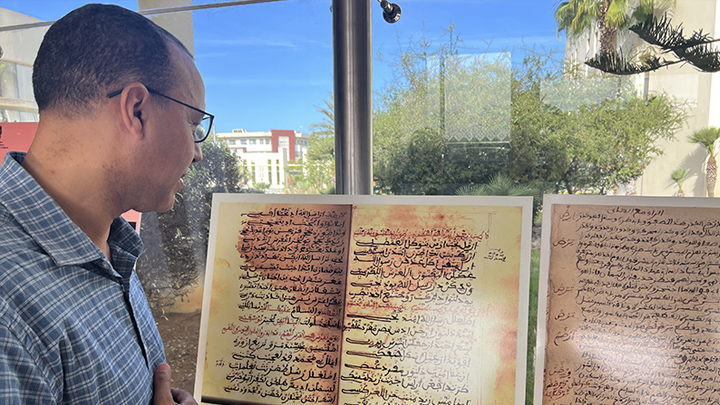Dris Soulaimani in Morocco on Fulbright During Academic Year 2023-24

Dris Soulaimani, an associate professor in the Department of Linguistics and Asian/Middle Eastern Languages is investigating Berber historical manuscripts written in Arabic script thanks to a Fulbright in Morocco for the academic year 2023-24. His study aims to analyze the content of these manuscripts and identify the different genres found in the works — such as religious, historical, or linguistic.
“I will also examine the extent to which these manuscripts reveal, if any, a distinct Berber identity,” Soulaimani said. Official languages used in Morocco include Arabic and Amazigh (also known as Berber). Since the 12th century mostly religious (and sometimes scientific) texts were written in Amazigh (Berber).
Soulaimani’s research includes searching for those historical documents, studying and translating a selected few to determine the social context of the writings. During his time in Morocco, he plans to interview families who have historical Berber manuscripts in private collections.
Soulaimani grew up in Morocco and is bilingual in Arabic and Berber. His journey will take him to a library called King Abdulaziz, located in the city of Casablanca. He will also visit multiple regions in the south of Morocco, like the city of Agadir. He’ll visit Moroccan archives, government offices, local libraries, and mosques as well — in search of these rare, historical archives and manuscripts.
This year, Soulaimani has met with a number of Moroccan scholars to discuss the Amazigh manuscripts. “I’ve also visited the Royal Institute of Amazigh Culture, known as IRCAM, and the national library in Rabat,” he said. “I'm currently working on an Islamic text written in the Tachelhit dialect in the Arabic script, and one written in the Arabic language.”
Soulaimani is looking forward to discovering many surprises along the way as he continues his research through 2024.
